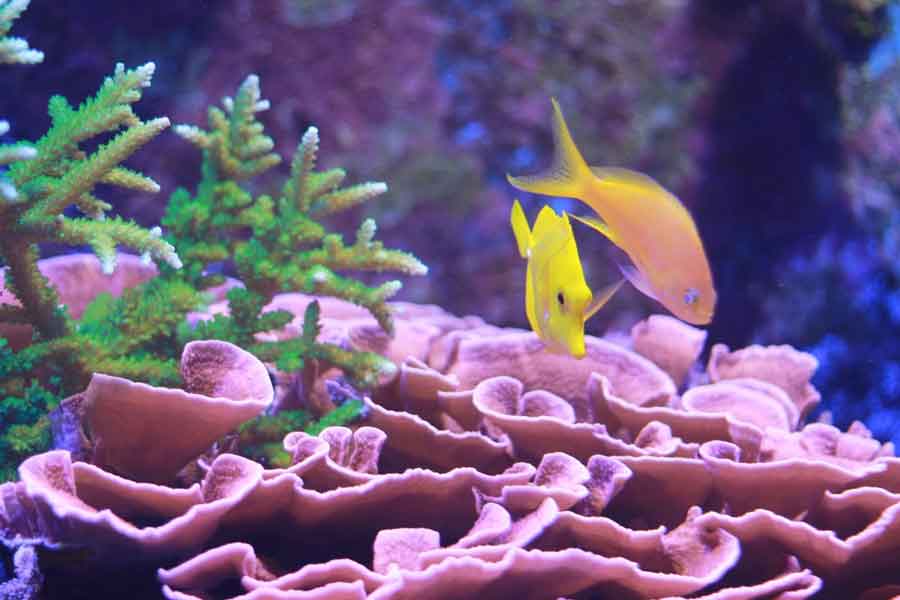A thriving saltwater aquarium is a dynamic system—the populations of bacteria, algae, and invertebrate life adjust to the conditions you provide and resources available to them for growth.
What does it take to have a successful, thriving saltwater aquarium?
There are no secrets or silver bullets, but there are a few habits and behaviors demonstrated by responsible reef aquarium owners that lead to success more often than not.
Here are 7 habits of a responsible reef aquarium hobbyist.
Habit 1: Do their research first
A responsible reef aquarium hobbyist enjoys researching the living creatures they hope to keep in their tanks and spends the time to learn about care requirements before purchasing.
Before you buy, you want to know at least a few of the following facts about your intended saltwater fish or coral purchase:
- Compatibility—is it incompatible with any other species? Is it aggressive to other fish or corals?
- Average lifespan—how long will this animal (in good care) be in your care?
- Adult size—it might be cute and little now, but how big will it end up?
- Minimum tank size—do you have the space to meet its needs?
- Feeding—what and how does it eat?
Habit 2: Don’t buy on impulse
Let’s face it, we all have the ‘gotta have it’ gene.
Collecting is part of what makes this hobby so enjoyable for us, but over the years, I’ve noticed that the people with longevity in this hobby are the ones able to resist that gotta have it urge most of the time and don’t buy on impulse.
Instead, they research, plan, and buy responsibly. Buying on impulse is a recipe for disaster—and disasters often start out small and then become big problems. Take my word for it.
Impulse buys can have special requirements you just can’t meet in the aquarium.
Sometimes they are not reef safe and will eat your prized corals, clams, or other invertebrates.
They can be aggressive and terrorize your mild fish. Terrorized fish often succumb to parasitic infections, like marine ICH or bacterial infections, which can spread throughout your tank and kill other animals.
Or maybe the impulse buy wasn’t a healthy fish and it just disappears one day and rots in the back of your tank behind the rocks.
Regardless, it’s not worth it. A lot can go wrong and often it does, in a big way.
Habit 3: Use proper quarantine procedures, even when they don’t want to
Patience and discipline are important virtues in this hobby. One of the hardest tests we all face is when we decide whether or not to put our new purchase in quarantine before adding them to our display tanks.
Are we willing and able to deny ourselves the instant gratification of adding the fish or coral right to our display tank for the benefit of allowing time to observe and treat any issues that might be present?
The quarantine process can feel like it takes an eternity, but it is one of the most important things you can do to protect your tank and the livestock you already have from unintended consequences.
While it might feel like 30 days in quarantine is a big price to pay, it is well worth preventing a major, avoidable issue in your tank.

Habit 4: Demonstrates mastery of balance
One of the most important concepts that drives overall success with a saltwater aquarium is balance.
Maintaining a healthy reef aquarium environment is all about keeping the water quality high and keeping it from changing dramatically over time—and doing that requires balance.
The most successful reef tank owners know that maintaining balance means:
Not overfeeding
It’s tempting to want to stuff our piscine loved ones with delicious morsels of food every time we walk in front of the tank.
Some species of fish will actually swim to the front glass (or acrylic) and pander for food.
But the responsible aquarium owner knows that too much food results in too much waste—either from increased digestion or from uneaten food.
Too much of a good thing can overwhelm a biological filter and cause big problems.
Not over-stocking the tank
The responsible aquarium owner also knows that balance is important to keeping a viable biological filter that protects the livestock in the tank—and that adding too much livestock all at once upsets that balance and can result in catastrophe.
A spike in ammonia levels, caused by adding too much livestock at once, can burn your animals or even kill them.
Take your time and spread out acclimation to your new tank over a few days (or a week) to give your biological filter some time to adjust—and monitor those water conditions, performing water changes as needed, to keep water parameters in check.
Do not make a lot of changes all at once
Let’s face it, the other genes we all tend to share in this hobby are the ‘tinkering’ gene and the ‘upgrading’ gene.
We tend to be the type of person who wants to add the latest tech or just tinker to make one more thing better about our tanks.
Tinkering and improving things is generally a good thing, but doing too much too quickly can upset the balance of our tanks and cause big issues.
The ocean is an environment that doesn’t change very quickly—and when the reefs in our homes change too quickly, that can often spell disaster for the inhabitants.
The old salty veterans know that while tinkering and upgrading are part of the joy of the hobby, they can also be the enemy of stability—and the best of the best do tinker, but make changes very slowly, to minimize stress or shock to the livestock
Habit 5: Follow routines
Another way the most successful hobbyists maintain consistent water quality is by following routines. Some of the happiest and successful aquarium owners I know are almost obsessive, or compulsive about routine.
They have a system and they stick to it. On the surface, it can look a little…well…obsessive or compulsive…but the fact of the matter is that these people also tend to have the most pristine, perfect tanks.
They have maintenance, cleaning, and feeding all down to a rhythm—and the animals in their tanks know exactly what to expect and they tend to thrive.
I’m not recommending you follow a routine to the level of compulsion, but I do think there is merit in figuring out a routine, tweaking that routine to optimize it, and then sticking to it, in the name of stability for your tank.
Habit 6: Follow advice, don’t ignore it
Another distinguishing feature of the most successful aquarium owners is that they tend (more often than not) to seek advice and they follow it, rather than challenge it.
Taking the other side of the issue for a moment to make a point, the people who seem to burn out fastest in this hobby are those who enter with their hair on fire, ready to start their tank.
They ask a lot of questions but don’t seem to want to take the advice.
They might learn about the one fish per tank rule, the don’t mix species rule, and the don’t mix these fish with these invertebrate rules…but they think…that doesn’t apply to me.
Sometimes it can be difficult, when starting out, to be able to tell good advice from bad advice, but the people who burn out fast are those with a knack for ignoring the good advice and doing their own thing, despite receiving that advice.
So if you want success, ask lots of questions from those with experience and then take the advice they so thoughtfully offer.
Habit 7: Carefully feed the animals in their tanks
The people I’ve met who enjoy their tanks the most are those who know about the nutritional requirements of all their inhabitants and enjoy the act of feeding them—not just the fish—but the corals and other invertebrates too.
Almost everything you will care for in your tank is an animal—which means (among other things) that it eats other stuff…do you know what stuff it needs to eat to be healthy?
Do you take the time each week to make sure you’ve met its nutritional needs?
Did you enjoy watching it eat?
Take some more time this week to enjoy that aspect of the hobby and feed those animals with care.
If you can embrace the concept of caring for your aquarium more than just ‘maintaining’ it, you will likely have more enjoyment and success.
Conclusions
There are no guarantees in this hobby.
Because our tanks and the life within it are so dynamic, things are always changing.
But if you develop good habits, like those described in this article, you will increase the likelihood that you can care for these amazing creatures for a very long time.
About the Author
Albert B. Ulrich III is a long-time saltwater aquarium enthusiast and Amazon bestselling author of The New Saltwater Aquarium Guide and SaltwaterAquariumBlog.com










0 Comments